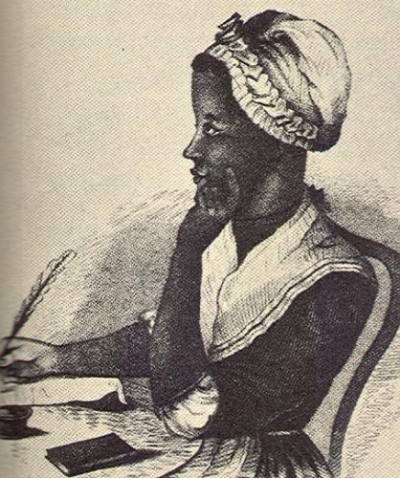Phillis Wheatley (Phillis Wheatley)

Although the date and place of her birth are not documented, scholars believe that Phillis Wheatley was born in 1753 in West Africa, most likely in present-day Gambia or Senegal. Wheatley was brought to British-ruled Boston, Massachusetts on July 11, 1761, on a slave ship called The Phillis. It was owned by Timothy Fitch and captained by Peter Gwinn. At the age of eight, she was sold to the wealthy Boston merchant and tailor John Wheatley, who bought the young girl as a servant for his wife Susanna. John and Susanna Wheatley named the young girl Phillis, after the ship that had brought her to America. She was given their last name of Wheatley, as was a common custom if any surname was used for slaves. The Wheatley’s eighteen-year-old daughter, Mary, first tutored Phillis in reading and writing. Their son Nathaniel also helped her. John Wheatley was known as a progressive throughout New England; his family gave Phillis an unprecedented education for an enslaved person, and for a female of any race. By the age of twelve, Phillis was reading Greek and Latin classics and difficult passages from the Bible. Recognizing her literary ability, the Wheatley family supported Phillis’ education and left the household labor to their other domestic slaves. The Wheatleys often showed off Phillis’ abilities to friends and family. Strongly influenced by her studies of the works of Alexander Pope, John Milton, Homer, Horace and Virgil, Phillis Wheatley began to write poetry.
In 1773, at the age of twenty, Phillis accompanied Nathaniel Wheatley to London in part for her health, but also because Susanna believed she would have a better chance publishing her poetry there. She had an audience with the Lord Mayor of London (an audience with George II was arranged, but Phillis returned home beforehand), as well as with other significant members of British society, including Selina Hastings, the Countess of Huntingdon, who lent her support to Wheatley’s work and allowed a volume of Wheatley’s poems, published in London in 1773, to be dedicated to her.[9] In 1774, Phillis Wheatley wrote a letter to Reverend Samson Occom, commending him on his ideas and beliefs of how the slaves should be given their natural born rights in America. Along with her poetry, she was able to express her thoughts, comments and concerns to others. In 1775, Phillis Wheatley sent a copy of a poem entitled, “To His Excellency, George Washington” to him. In 1776, Washington invited Wheatley to visit him at his headquarters in Cambridge, Massachusetts, which she did in March of 1776. Thomas Paine republished the poem in the Pennsylvania Gazette in April of 1776.
In 1778, Wheatley was legally freed from slavery by her master’s will. His daughter Mary Wheatley died soon afterward. Three months later, Phillis Wheatley married John Peters, a free black grocer. They struggled with poor living conditions and the deaths of two infant children. Wheatley wrote another volume of poetry but was unable to publish it because of her financial circumstances, the loss of patrons after her emancipation (often publication of books was based on gaining subscriptions for guaranteed sales beforehand), and the competition from the Revolutionary War. However, some of her poems that were to be published in that volume were later published in pamphlets and newspapers. Her husband John Peters was imprisoned for debt in 1784, leaving an impoverished Wheatley with a sickly infant son. She went to work as a scullery maid at a boarding house to support them. The racism and sexism that marked the era had forced her into a kind of domestic labor that she had not been forced to do while her freedom was held by her masters. Wheatley died on December 5, 1784, at age 31. Her infant son died three and a half hours after her death.
Born
- January, 01, 1753
- Senegal, West Africa
Died
- December, 05, 1784
- USA
- Boston, Massachusetts
Cemetery
- Copps Hill Burying Ground
- Boston, Massachusetts
- USA



